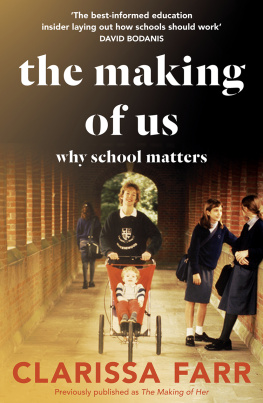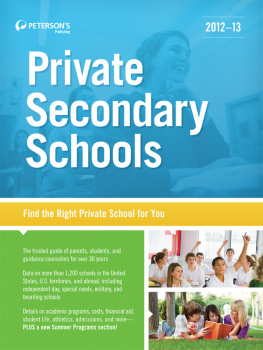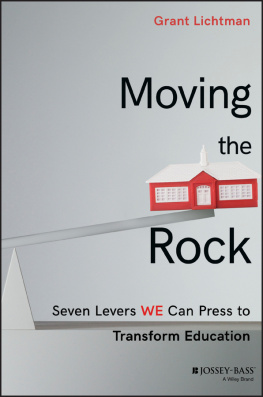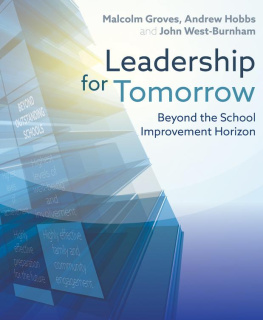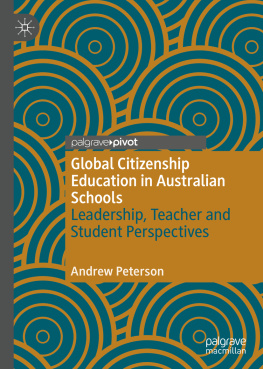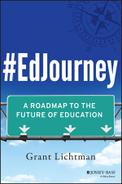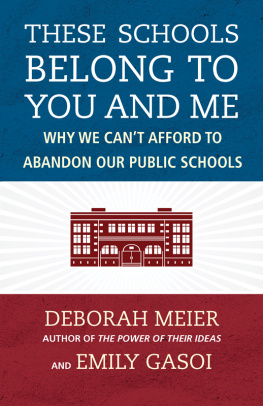Contents
Contents
Guide
THE MAKING OF US
Why School Matters
Clarissa Farr

Remembering my parents, Alan and Wendy Farr
In the autumn of 2016, after ten years at St Pauls, it came to me quite suddenly that my work there was finished and it was time to do something else. As with other big changes in my life, a restlessness had been stirring in me and I had felt the moment would come when it was ready. It did. As I sat listening to our choir and orchestra playing at the annual joint concert with St Pauls boys school on a soft September evening, enjoying the wonderful achievements of our two directors of music, I realised that I had brought everything I could to the job. It was time to make way for a new leader and there was, somewhere, a new challenge beckoning me. I didnt know what it was yet that would come. So I went into school the next morning and wrote my resignation letter.
Change in a community is often unwelcome at first. The senior girls I met with every week were a little dismayed; didnt I like them any more? I explained my thinking in terms of the sigmoid curve. In any episode of your life or work, after the effortful start-up period, there is a gradual escalation of capability until eventually, you reach a peak. After that, watch out: your effectiveness, because you have become complacent, or too native to the culture, or bored, begins to fall away. The skill is to find the point on the upward curve when you have made a satisfying and significant contribution but have not yet reached the point where you have done all your work where there is still more you could have done. This is the point to make the change. That act may feel reckless, frightening: what will you be, who will you be, when you have walked away from that all-consuming, all-defining role? You have stepped out onto a new curve and at first, it may dip downwards, into uncertainty and confusion. But gradually you will find your feet, and new growth will be possible, which can take you up and beyond, onto another path.
The girls listened thoughtfully while I explained this. They looked at each other and I could see it made sense to them. So, its a bit like when David Tennant left Doctor Who? one ventured. Exactly, I said. Youve got it.
Like many of my generation now, I dont think of a career ending but of a new one starting: a new period of working life which for me, involves writing, speaking, working as a non-executive director, adviser or governor for four schools and a museum, and bringing my experience of educational leadership to the development of a fast-growing international schools group. One former head who has helped me work out how to design this next phase of life explained she had found it helpful to think in terms of three things: learning, earning and giving. I am learning about the world of museums and the world of business the one very similar and the other very different from what I have known before earning my living through advisory work and giving back through board involvement in the charity sector. Getting the balance of these elements right is a challenge and may take longer I am only a year into this new portfolio life but thus far the exploration is stimulating, energising and challenging.
How is retirement? well-meaning people younger than me ask, with the assumption that after a long phase of working life in a high-profile role, you must somehow slacken into doing less, that you are in decline. I think of Millaments wonderfully ironic line in Congreves The Way of the World when she undertakes to dwindle into a wife. I see this not as an afterthought but as a new beginning, and for all the difference in our ages, feel more affinity with the girls stepping away from school into their new lives than with those in mid-career. Nothing is certain and the sad loss of several friends of my generation in recent years is sobering; ill health can strike at any time, putting an abrupt stop to it all. But all the more reason to use the energy and experience you have as fully as possible.
Wherever it takes place in a parents arms, in the classroom, on a mountain path or on the football pitch our education is the story of the growth of our human capability, of the making and remaking of ourselves, a process which begins with our parents, is explored through our schooling and which continues throughout our lives. For all that our school life is formative, we ourselves are the principal instruments of that process. We all, and especially those of us who work in education, with its endless pouring out of the self, have to remember to pay attention to our own development by creating for ourselves as we do for others enough challenge, but stopping short of what might overwhelm us. In this way, we can continually grow in our capability, to find and follow the true grain of our being, to become the best the only version of ourselves that we can be. That may face us with difficulty from time to time, and is a ceaseless task.
Gillian Stamp introduced me to the words of the third-century philosopher Plotinus, much revered by John Colet, who, using the image of the carver in stone, describes the duty of care to tend the self: Withdraw into yourself and look. And if you do not find yourself beautiful yet, act as does the creator of a statue that is to be made beautiful; he cuts away here, he smooths there, he makes this line lighter, this other purer until a lovely face has grown on his work. So do you also never cease chiselling your statue.
I hope one day to have time to go back to sculpture: I have so much still to learn.
Once, when thanking leaving teachers in the end-of-year assembly, I accidentally left out a very cheerful PE teacher who had given a lot to the school and was returning home to Australia. I felt dreadful listening to her afterwards saying bravely, It doesnt matter, when it clearly did. Since then, as someone who believes in showing appreciation, I have had a recurring fear of omitting some vital person from any such announcement. The acknowledgments page of this book has therefore given me more anxiety than any other.
And since there are genuinely far too many people who deserve recognition here to name them all, I am going to keep it short. First, warm thanks to my colleagues, especially the senior leadership teams at Queenswood and St Pauls. It has been a pleasure working with you and learning from you, and seeing you continue to fly onward in your careers. The wise counsel of governors and fellow heads of school during twenty-one years of headship has improved my work in myriad ways. Each year I reflected that as girls left the school, I would equally miss their parents. Thank you to the many families who extended their warmth and care to supporting their daughters education, as well as so much more. And the girls: surprising, funny, clever, inspiring, humbling, maddening if not for you, then what would it have all been about?
It was the generous introduction provided by David Bodanis to Patrick Walsh at PEW Literary, who in turn convinced me I could write and led me to meet Arabella Pike at HarperCollins, that enabled me to publish this book. While all the mistakes in the book are entirely mine, my gratitude is due to them all.
Finally and most importantly to my family. My brother Richard, a real writer, listened patiently and gave me countless ways to bring the book back on track when I was stuck. John, who gave unwavering support during the years of my two headships, taught me to have a nose for a story and was the first to encourage me to write a book. And our children Isobel and Adam not only patiently tolerated having a working mother but were are ever ready with that levelling remark: Youre not high mistress here, you know!

